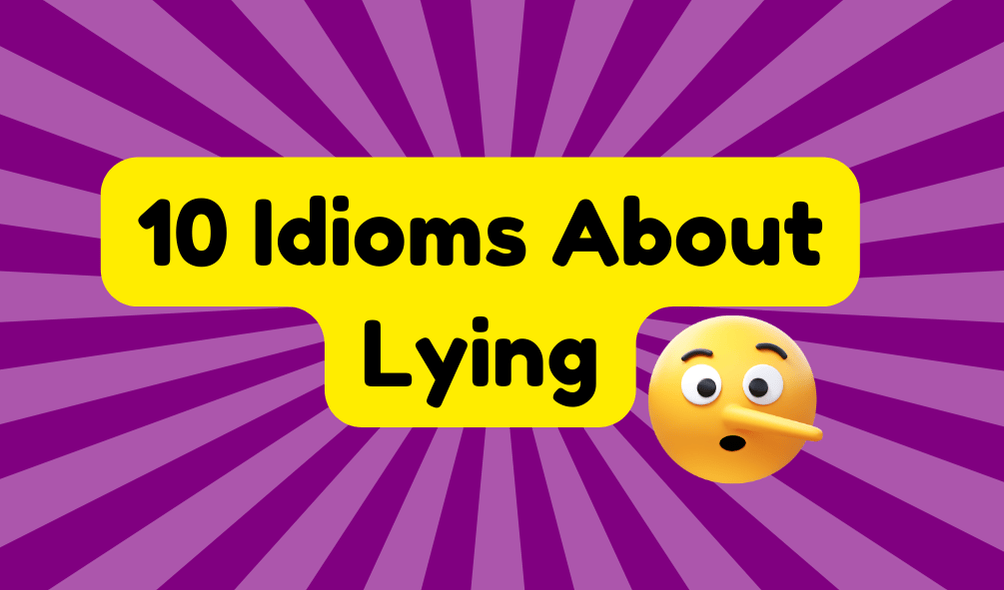When talking about lying, three idioms come to mind. First, “pulling the wool over someone’s eyes” means tricking or deceiving someone. Next, “liar, liar, pants on fire” humorously suggests someone is lying and will face consequences. Finally, “bending the truth” refers to exaggerating or altering facts, creating a less-than-honest portrayal. Each idiom highlights how lying can affect trust and relationships. If you keep exploring, you’ll discover even more interesting expressions related to deception!
Pulling the Wool Over Someone’s Eyes
Meaning
To “pull the wool over someone’s eyes” means to deceive or trick someone, making them believe something that isn’t true.
Example Sentences
- Jamie thought she could pull the wool over her parents’ eyes by saying she was studying at a friend’s house.
- The con artist was great at pulling the wool over people’s eyes with his charming stories.
- It’s hard to pull the wool over my brother’s eyes; he always knows when I’m hiding something.
Additionally, the art of deception can often reflect the cultural nuances of how people communicate, making it essential to understand the importance of discretion in communication.
Bending the Truth
Meaning
“Bending the truth” refers to telling a lie or exaggerating the facts in a way that alters reality, even if it’s not a complete fabrication.
Example Sentences
- When Sandy told her friends about her vacation, she was bending the truth when she said she stayed in a luxury hotel.
- Instead of sharing the boring details, Tom started bending the truth about his job to impress his date.
- Bending the truth might sound harmless, but it can lead to bigger misunderstandings later.
Creating a Smoke Screen
Meaning
Creating a “smoke screen” means to use deception to hide the truth or divert attention from what’s really happening.
Example Sentences
- The politician created a smoke screen with an unrelated scandal to distract the media from his own issues.
- Whenever she forgot an important date, she’d create a smoke screen by talking about her busy schedule.
- They used a smoke screen of excuses to hide their real intentions during the meeting.
Telling a White Lie
Meaning
“Telling a white lie” refers to telling a harmless lie, often to avoid hurting someone’s feelings.
Example Sentences
- When Rachel’s dress didn’t look great on her, her friend told a white lie and said it looked beautiful.
- Sometimes telling a white lie is all that’s needed to keep the peace in a friendship.
- I’d to tell a white lie about my plans to avoid hurting my friend’s feelings when she wasn’t invited.
Pulling a Fast One
Meaning
“Pulling a fast one” means to trick someone or deceive them, often in a clever or sneaky way.
Example Sentences
- I can’t believe he thought he could pull a fast one on the teacher with that fake excuse!
- The prankster was always pulling a fast one on his classmates, making it hard to trust his stories.
- She tried pulling a fast one to get out of the group project, but her teammates weren’t fooled.
Lying Through One’s Teeth
Meaning
To “lie through one’s teeth” means to lie blatantly and with confidence, often with the intention to deceive.
Example Sentences
- Mark was lying through his teeth when he said he completed the assignment the night before.
- She was lying through her teeth, claiming she’d never been to the party last weekend.
- His story was so far-fetched that it was obvious he was lying through his teeth.
These idioms really highlight the different ways people lie and deceive others.
Whether it’s a harmless white lie or something more serious, understanding these phrases can help you navigate conversations about honesty and deception more easily!
Liar, Liar, Pants on Fire
This idiom suggests someone is lying, and it humorously implies that their pants could catch on fire from the lies they tell.
Example Sentences
- When Jake said he finished his homework, I thought to myself, “Liar, liar, pants on fire,” since he never does it on time.
- Sarah claimed she didn’t eat the last cookie, but when I checked the crumbs, I knew she was a liar, liar, pants on fire!
- During the game, when Tom insisted he could sing better than anyone, I couldn’t help but shout, “Liar, liar, pants on fire!”
Additionally, it’s essential to recognize the impact of positive vs. negative idioms in understanding the nuances of honesty and deception.
Caught Red-Handed
Meaning
This idiom is used when someone is caught in the act of doing something wrong or dishonest, like being caught with their “hand” on the cookie jar.
Example Sentences
- I wasn’t surprised when he denied taking my phone, but I caught him red-handed with it in his backpack!
- She tried to cheat on the test, but the teacher caught her red-handed, so she couldn’t escape punishment.
- I knew he was lying about his whereabouts until I caught him red-handed at the party he said he never attended.
The Truth Will Out
Meaning
This idiom means that no matter how hard someone tries to hide the truth, it will eventually become known.
Example Sentences
- He thought he could keep his secret forever, but as the old saying goes, the truth will out, and everyone found out.
- The scandal seemed buried, but in this case, the truth will out, and the media got wind of it.
- She thought lying to her friends would protect them, but the truth will out, and it just caused more problems.
A Fish Story
Meaning
This idiom describes a tale that’s exaggerated or untrue, often involving great details that are hard to believe.
Example Sentences
- When he said he caught a fish this big, I immediately thought it was just a fish story!
- Her account of winning the championship without any practice sounded like a fish story to me.
- It’s hard to trust him because every time he speaks, it feels like another fish story.
These idioms add color and creativity to our conversations about honesty and deception, reminding us to be thoughtful about the words we choose and to recognize when someone mightn’t be telling the truth!
Stretch the Truth
Meaning
To stretch the truth means to exaggerate or make something sound better than it really is.
Example Sentences:
- When he told me he ran five miles, I knew he was just stretching the truth.
- You shouldn’t stretch the truth on your resume; it could come back to haunt you in an interview.
- She always stretches the truth when she talks about her weekend adventures.
Play Fast and Loose
Meaning
To play fast and loose refers to handling something in a reckless or irresponsible manner, often with unreliable or dubious honesty.
Example Sentences:
- If you play fast and loose with the truth, you might end up losing friends.
- The politician has a reputation for playing fast and loose with the facts.
- She was playing fast and loose with her promises, which made others skeptical of her.
These idioms show that while bending the truth is common, it can lead to misunderstandings and sometimes damage trust. Importantly, establishing healthy communication techniques is crucial to fostering genuine relationships.
The next time you hear one of these phrases, you’ll know exactly what they mean!
Frequently Asked Questions
What Are the Origins of These Idioms About Lying?
Have you ever wondered where the roots of phrases come from? Exploring the lying origins reveals fascinating tales of idiom development that reflect cultural beliefs, social behaviors, and the timeless struggle between truth and deceit.
Can These Idioms Be Used in Formal Writing?
You can include idiomatic expressions in formal writing, but it’s crucial to contemplate the audience. If your readers appreciate creativity, cleverly weaving idioms might enhance your message, but overuse could undermine professionalism. Be selective!
Are There Similar Idioms in Other Languages?
Did you know over 7,000 languages exist globally? In cultural comparisons, language nuances reveal fascinating idioms across tongues, showcasing how different societies interpret lies, truth, and deception, reflecting their unique values and communication styles innovatively.
How Do These Idioms Reflect Cultural Attitudes Toward Honesty?
You’ll find that cultural perception shapes how honesty ethics are viewed. Different societies emphasize truth-telling or deception, reflecting unique values and beliefs, ultimately influencing the language and idioms they create around honesty and integrity.
What Psychological Effects Does Lying Have on Individuals?
Lying might seem like a quick fix, but it often haunts you with guilt feelings. You’ll face trust issues, eroding connections that could’ve thrived. Embrace honesty instead; it’s the path to true liberation and innovative relationships.






